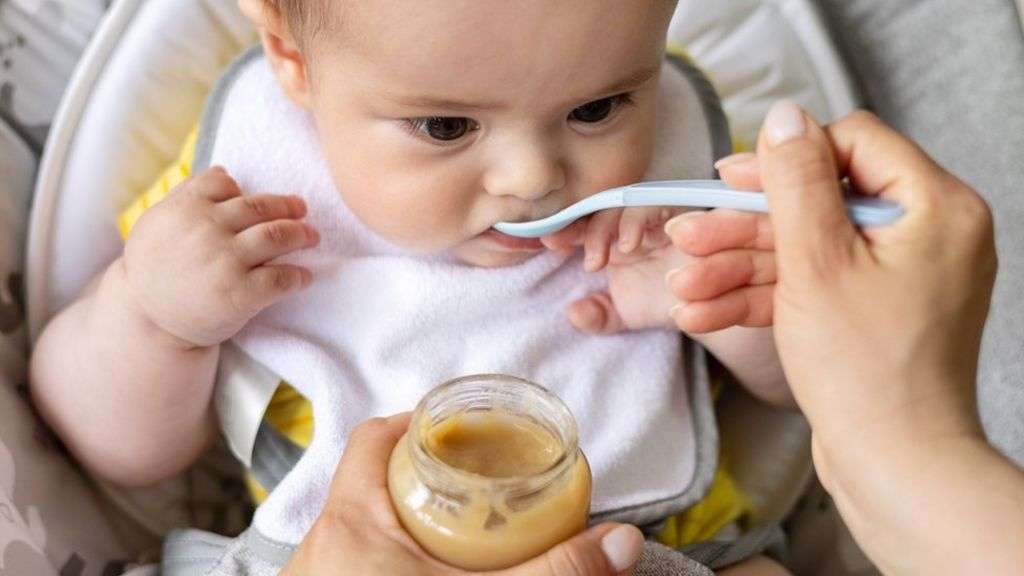Giving smooth peanut butter to babies and throughout early childhood could give lifelong protection against peanut allergy, researchers say.
Teenagers who ate it up to age five were 71% less likely to develop an allergy than if the food was shunned.
The team at King's College London advise parents to offer peanut butter during weaning, then regularly and in large amounts until age five.
Under-fives should not eat whole or chopped peanuts due to choking hazards.
The idea of giving peanut butter to babies and young children will horrify a generation of parents who were told to avoid the foodstuff due to the fear of allergies. The advice at one point was to avoid peanuts completely until age three.
But peanut allergies are becoming more common, now affecting one-in-50 children, and the ingredient is now banned from many schools.
The Kings College research has shown the original advice was wrong. Instead, early life is a critical period for the immune system to learn to recognise friend from foe.
Food allergies are the result of our immune system mistaking something harmless for a severe threat. It is why a small amount of peanut can cause an overwhelming and life-threatening reaction in somebody with an allergy.
Around 15 years ago, 640 children at high-risk of peanut allergy started taking part in a clinical trial. Half avoided peanut and half had it as part of their diet between four-months-old and five-years-old.
The original results showed eating peanut butter led to a dramatic reduction in allergies by the time children celebrated their fifth birthdays.
But would that protection last or would those children need to take peanut constantly to stay protected?
The findings, now published in NEJM Evidence, showed the protection lasts whether children kept eating peanut or removed it from their diet.
In their teenage years:
- Some 15 out of every 100 high-risk children that avoided peanut as an infant developed an allergy
- Just four out of every 100 high-risk children that regularly ate peanut as an infant developed an allergy
- It marked a reduction in allergy of 71%
- Whether children kept eating peanut after five did not matter
"I'm delighted to see this protection continues into adolescence," Prof Gideon Lack, from King's College London, told the OceanNewsUK.
He added: "We have good reason to believe [it will last] for the life of the individual, it is extremely unusual to see new onset of peanut allergy in adolescent years.
"This simple intervention will make a remarkable difference to future generations and see peanut allergies plummet."
The team advise including a soft paste of peanut butter or peanut puffs into a baby's diet once they are ready for solids. This is when:
- They can stay in a sitting position, holding their head steady
- Co-ordinate their eyes, hands and mouth so they can look at their food, pick it up and put it in their mouth
- Swallow food, rather than spit it back out
After that point, peanut butter be consumed three-to-four times a week adding up to around one-and-a-half or two tablespoons of peanut butter a week.
It means the body's first experience of peanut is in the tummy where it is more likely to be recognised as food rather than on the skin, where it may be more likely to be treated as a threat.
The team suggest starting at four months if possible as this is before food allergies tend to emerge.
However, the UK's National Health Service (NHS) say parents can give smooth peanut butter to children from six months old and the World Health Organization (WHO) argues for exclusive breast feeding for the first six months.
It remains unclear whether children need to consume peanut for the full five years to reduce the allergy risk, or if just the impact is confined to the early period of their development.
Prof Lack says the "safest and wisest" thing to do would be the full five years as "we're talking about normal nutritious foods, not medication".
The team estimate 100,000 cases of peanut allergy could be prevented globally every year.
The US's National Institute of Allergy and Infectious Diseases funded the Kings College study.
The organisation's director Dr Jeanne Marrazzo said: "Today's findings should reinforce parents' and caregivers' confidence that feeding their young children peanut products beginning in infancy according to established guidelines can provide lasting protection from peanut allergy."








